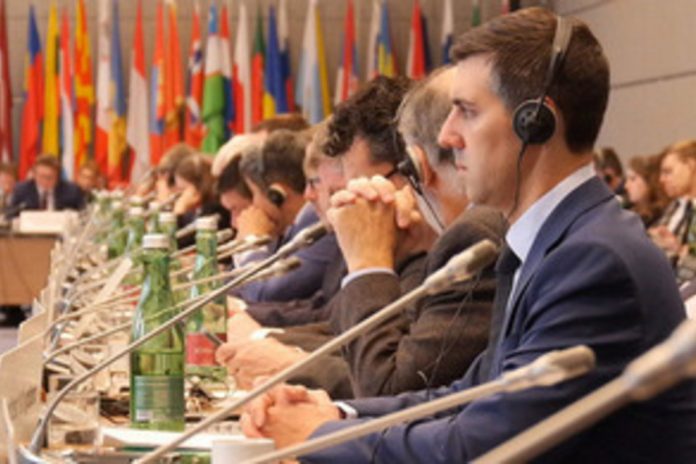Thank you Mr Chair. We share the concerns expressed today by the EU and other international partners on Russia’s continued violation of OSCE principles and commitments in illegally annexed Crimea and in eastern Ukraine. Following the anniversary yesterday of the Normandy Four leaders’ Summit held in Paris, my statement will focus on two key commitments made at the summit: prisoner exchanges and the opening of new Entry Exit Checkpoints.
However, I would like to start by thanking the Albanian chairpersonship for rightly keeping a high focus on the conflict instigated and fuelled by Russia at this year’s Ministerial Council. The UK welcomed the opportunity to join international partners for a discussion, hosted by Ukrainian Foreign Minister Kuleba, on Russia’s illegal annexation of Crimea. We were also proud to join 34 other co-sponsors in putting forward a draft decision on strengthening OSCE monitoring at the uncontrolled segment of the Ukraine-Russia border; we regret that Russia refused to engage constructively on the text.
The UK continues to welcome the significant reduction of violence since the strengthened ceasefire came into effect on the 27th July, which was a key commitment of the Paris Summit. However, we were concerned to see that the SMM’s weekly report of 8th December registered a two-fold increase in the weekly total of ceasefire violations, compared with the previous week, and more than a three-fold increase in the number of explosions. We were also saddened to read in the SMM’s recent reporting, for the first time since the 27th July, of two civilians who have sustained injuries due to shelling, as well as of the first damage to civilian property recorded by the Mission. We must not be complacent.
Less progress has been made on other key commitments. As the holiday season approaches, we cannot forget those who remain in detention, separated from their families. At the Paris Summit, all sides agreed to promote the release and exchange of detained persons associated with the conflict. The prisoner exchanges in December 2019 and in April of this year clearly demonstrated what is possible when there is political will; however, there have been no further exchanges since and progress appears stalled. We remind Russia of its commitment and urgently call on it to match the political will Ukraine has shown on this issue.
We would also like to highlight the urgent need to make progress on another key Paris Summit commitment to open new Entry Exit Checkpoints. EECP’s are essential for Ukrainian civilians to access jobs, education, pensions, medical care and to see their families. It is entirely unacceptable that a month after the agreed opening date, the Russia-backed armed formations are blocking the opening of the two new checkpoints at Shchastia and Zolote. We call again on Russia to use its influence to ensure that there is a simultaneous and coordinated opening without any further delay.
We are also deeply concerned by reporting of international organisations that the majority of entry-exit checkpoints remain closed on the non-government controlled side under the pretext of COVID-19 measures. As a result, the number of people crossing the line of contact continues to fall, with only around 21,000 crossings recorded by the UNHCR in October, compared to over 1.4m crossing during the same period last year. While reasonable precautions should be taken to prevent the spread of COVID-19, the pandemic should not be used as a pretext for unnecessary limitations on freedom of movement.
The UK reiterates our support for the Minsk agreements and our firm commitment to see the peaceful resolution of the conflict in full respect of Ukraine’s sovereignty and territorial integrity. We welcome the work of the Normandy Four and the Trilateral Contact Group in this regard, and we thank Ambassador Grau and her team for their efforts to make progress on the issues I have addressed today. We call on Russia to engage productively, and match the political will demonstrated by Ukraine, so that real progress can be made.
We repeat our call on Russia to withdraw its military personnel and weapons from the territory of Ukraine; to cease its support for the armed formations it backs; to stop access restrictions and intimidation of the SMM in areas held by Russia-backed armed formations and to reverse all unilateral measures that undermine the Minsk agreements.
The UK strongly supports Ukraine’s sovereignty and territorial integrity within its internationally recognised borders, including its territorial waters. We do not and will not recognise Russia’s illegal annexation of Crimea. The UK has consistently stood with Ukraine in opposing all instances of Russian aggression towards Ukraine and we will continue to do so, including through sanctions with our international partners.







